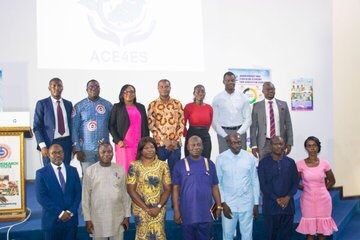The Crops Research Institute of the Council for Scientific and Industrial Research (CSIR-CRI) is calling for urgent action to improve policy clarity on Short-Lived Climate Pollutants (SLCPs) in Nationally Determined Contributions (NDCs) and National Adaptation Plans (NAPs).
The institute is also advocating for a more strengthened media capacity, institutional research capabilities, demonstration farms, and global investment in agroecology and climate action.
A research scientist at the Institute, Dr Kwaku Onwona-Hwesofour Asante made the appeal following the launch of the Agroecology and Circular Economy for Ecosystem Services (ACE4ES) project.
Dr Asante highlighted the critical need for more comprehensive and coherent policies on SLCPs within country-level NDCs and NAPs.
"Effective climate action requires robust policies that specifically address SLCPs, which are major contributors to climate change. Clear policy directives at both national and regional levels are essential for guiding sustainable agricultural practices and achieving significant emission reductions,"he emphasised.
The project is aimed at revolutionising agricultural practices in Africa to combat climate change and ensure food sustainability.
The project, funded by the Climate and Clean Air Coalition (CCAC), underscores the urgent need for coordinated efforts to reduce SLCP emissions from agricultural practices, particularly maize and rice production.
Short-Lived Climate Pollutants (SLCPs) such as black carbon from agriculture burning; methane and nitrous oxide from poor rice field and soil fertility management among others.
These pollutants not only exacerbate climate change but also pose direct threats to public health, agriculture, and ecosystem services.
From key global targets, black carbon emissions can be reduced by 70% globally by 2030, methane emissions by 40%, and HFCs by 99.5% by 2050 if stakeholders commit to action.
Implementing control measures identified by the United Nations Environment Programme (UNEP), World Meteorological Organisation (WMO), and National and Regional Scientific Organisations could achieve up to 90% of these reductions using existing cost-effective technologies.
Rapid deployment of these measures could lower global warming by up to 0.6°C in the next few decades, prevent 2.4 million premature deaths annually by 2030, and avert 52 million tonnes of crop losses each year.
In agriculture, effective SLCP mitigation strategies include improved management of rice paddies, animal health and husbandry, and eliminating open burning practices.
Technologies to be Validated by the ACE4ES Project
The ACE4ES project includes a comprehensive validation protocol to assess the effectiveness of various agroecology and circular economy technologies in mitigating SLCPs.

Key technologies being validated include alternative wetting and drying (AWD) for rice, biomass composting, biochar application, drought-tolerant rice varieties, no-tillage and limited tillage practices, integrated soil fertility management.
Others include livestock biomass management, symbiotic ecosystems (such as rice-fish and rice-duck systems), site-specific nitrogen fertilizer application, and crop-livestock systems.
These technologies are being tested for their potential to reduce emissions of methane, black carbon, and nitrous oxide, while improving soil health, crop resilience, and overall agricultural productivity.
Expanding Demonstration Farms for Mass Adoption
Dr Asante disclosed that one of the key components of the ACE4ES project is the establishment of demonstration farms.
These farms, according to him, will serve as practical examples of a better understanding of agroecological practices.
Dr Asante called for increased investment in demonstration farms to facilitate mass adoption.
"Demonstration farms are vital for showing farmers the tangible benefits of new practices. Scaling up these farms will accelerate the adoption of sustainable techniques across the continent," he added.
Boosting Institutional Research Capacity
Dr Asante revealed that to support the transition to sustainable agricultural systems, there is a pressing need to enhance Institutional capacity in research focused on agroecological systems.
"Investing in research is fundamental to developing innovative solutions and practices that can be widely adopted. Strengthening our research Institutions will enable us to better understand and optimize agroecological practices," he said.
Enhancing Media Capacity for Education and Sensitisation
The CSIR-CRI also stressed the importance of improving media capacity to conduct regular education and sensitisation programmes.
Director General of CSIR, Prof. Paul B. Bosu, indicated that both agroecology and circular economy are game changers which would require publicity.
He believes the media plays a crucial role in raising awareness and educating the public on the benefits of agroecology and the need for climate action.
“We need to empower media professionals with the knowledge and resources to deliver impactful and accurate educational content consistently,” he said.
Appeal for Global Investment in Agroecology and Climate Action
CSIR-CRI is therefore calling for increased global investment in agroecology and climate action.
"The fight against climate change and the quest for food security require significant financial commitment. We call on international donors, governments, and private sector partners to invest in agroecology and climate initiatives. Such investments are crucial for building resilient, sustainable food systems," Dr Asante urged.
The ACE4ES project, with its comprehensive approach and strong stakeholder collaboration, is poised to make a lasting impact on African agriculture.
However, achieving the broader goals of sustainable development and climate resilience would require concerted efforts and investments in all aspects of the project.
Latest Stories
-
Center for Learning and Childhood Development Director Dr Kwame Sakyi honoured at Ghana Philanthropy Awards
8 hours -
Asantehene receives 28 looted artefacts
9 hours -
CAF WCL 2024: Ghana’s Thelma Baffour wins title with TP Mazembe
10 hours -
Benjamin Boakye slams politicisation of energy sector issues and ECG’s inefficiencies
10 hours -
Erastus Asare Donkor and Dr Neta Parsram win big at 10th Mining Industry Awards
10 hours -
Government is “suppressing information” about power sector challenges – IES Director
10 hours -
Majority of our debts caused by forex shortfall – ECG Boss
11 hours -
Pan-African Savings and Loans supports Ghana Blind Union with boreholes
11 hours -
Bole-Bamboi MP Yussif Sulemana donates to artisans and Bole SHS
11 hours -
Top up your credit to avoid potential disruption – ECG to Nuri meter customers
12 hours -
Dutch & Co wins 2024 Entrepreneur of the Year Award
12 hours -
We’ll cut down imports and boost consumption of local rice and other products – Mahama
14 hours -
Prof Opoku-Agyemang donates to Tamale orphanage to mark her birthday
15 hours -
Don’t call re-painted old schools brand new infrastructure – Prof Opoku-Agyemang tells gov’t
16 hours -
Sunon Asogli plant will be back on stream in a few weeks – ECG
16 hours

